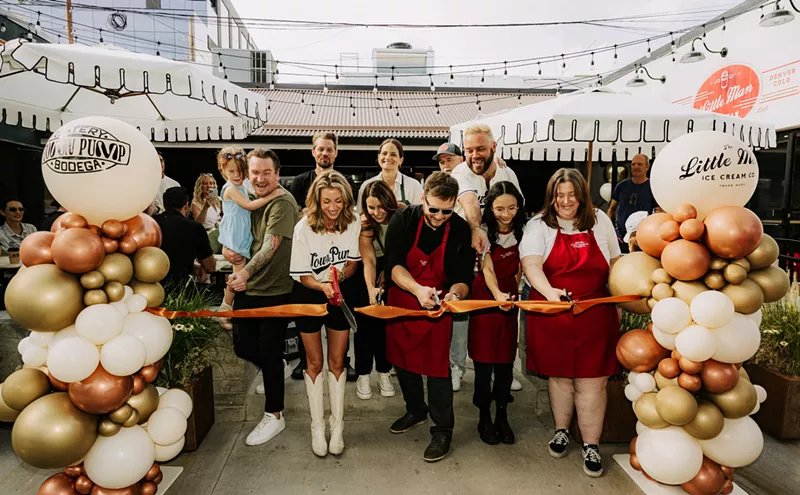"Yes, we are absolutely having a good time," says Rudi Hellvig, reiterating a sentiment he's already mentioned several times during this phone conversation. "We are having a good time. Yes, we are."
And it shows.
The comfy little Hungarian bistro has a homey, welcoming air, thanks to Rudi and Anna, his partner in business and life. Rudi runs the front of the restaurant; during our two meals, he regaled us with tales of his homeland, his family and his life here. He took not only our children, but everyone else's children as well, into the kitchen to meet Anna, who does all the cooking. And more than once, he proudly dragged the shy Anna out into the dining room so that she could listen to customers raving about her food. The two just stood there beaming, obviously enjoying themselves.
But then, they know what it's like not to have a good time running a restaurant.
When the Hellvigs came to the U.S. in 1979, they had a small family and a big dream of opening their own place. Back in Hungary, Anna's family had owned restaurants for as long as she could remember, and she'd grown up in them. "Her grandfather had a unique concept of franchising restaurants in Hungary long before there was such a thing," Rudi says, chuckling. "He was a womanizer, and so he went around to all of these small towns and opened little restaurants, got them going and then gave them to his lovers."
After the Communists took over in the early Fifties, though, the government closed all the restaurants. One uncle left the country and moved to Winnipeg, Canada, where he opened an eatery. "But Anna's aunt, she stayed and eventually sued the government, which was very brave, and she won back the smallest one," Rudi says. "She just closed it only three or four years ago."
In the early Eighties the Hellvigs opened their own place, the popular--sometimes too popular--Csardas, a 120-seat Hungarian eatery on South Broadway that featured a full bar and a huge menu. But they closed Csardas in 1990, when, as Rudi says, "it started running us instead of the other way around."
After that, they bought into Herb's Hideout at 21st and Larimer streets. "We went in there in 1993 and turned it from a skid-row bar into a piano bar," Rudi says. "A few weeks before Coors Field opened, we sold it. I had found it to be a great challenge, changing the atmosphere, and I really like the piano idea, but it really wasn't my type of business. I can tell you, I earned my gray hairs there."
The Hellvigs were left wondering what to do next. "You see, Csardas we had opened when ethnic wasn't very big here in Denver," Rudi explains. "We actually had started it in this little fifteen-seat spot at Logan and Hampden for a few months, and then--I think it was called Shogun, this Japanese restaurant nearby--it closed, and the owner talked us into taking it over. But we were so tired all the time. Since Anna does the cooking, I thought that this time it should be her decision as to whether we would open a restaurant again. And she said that it would be fine, as long as it was a small place, a place where we could have fun again."
Last spring they found just the place: the cozy space on South Pearl Street being vacated by the Philadelphia Filly. "It was perfect for us, except that the kitchen is very, very small," Rudi says. "I have to give Anna a lot of credit for turning out all the food that she does in that unbelievably tiny space."
And for turning it out so well.
Since in this country our notion of Hungarian food usually stops at goulash and stuffed cabbage, it was refreshing to see other Hungarian specialties on Budapest Bistro's menu. It was even more refreshing to find that these dishes were proficiently cooked and filled with flavors and textures that few other cuisines offer.
Everyone's eaten sauerkraut, for example, but how many can say they've had it with ground beef, rice, paprika, black pepper, garlic, marjoram and sour cream? That was the "Transylvania Kraut" appetizer ($5.95), a mixture of soft and crunchy, sweet paprika and sour cabbage and cream, with marjoram tying it all together. We ate our kraut with "Peasant's Delight" ($5.25), two disks of puffy fried bread, or langos, that were reminiscent of Indian fry bread, only saltier and less chewy and with a strong hint of garlic.
Budapest Bistro does serve goulash soup ($4.25), of course, the quintessential Hungarian dish that was popularized here by restaurateur Georg Lang, a Hungarian immigrant who has been maitre d' of New York's Four Seasons for a million years and published The Cuisine of Hungary cookbook back in 1971. Goulash is goulash is goulash, or so we thought until we tasted Anna's version. The heavy-duty beef broth had been further enhanced by celery, onions and carrots, along with more of that marjoram and enough black pepper to give it some zing; it was packed with potatoes and light pasta dumplings, as well as large cubes of sirloin that had been cooked until the beef's fibers had started to pull away.
Budapest Bistro also offers goulash as an entree ($12.95), which turned out to be quite a different dish. According to Lang's book, the original gulyas--for which there are now as many recipes in Hungary as there are for marinara sauce in Italy and Irish stew in Ireland--was a shepherd's meal made from meat cooked with onions until the liquid evaporated, then put into a sheep's stomach and dried in the sun so that it would keep. The shepherd would just add water to the bag's contents to make gulyashus, a stew, or more water to make gulyasleves, a soup. Instant goulash.
Since I hadn't heard any bleating coming from the kitchen, I assumed Anna wasn't following the traditional recipe to make her delicious goulashes. In fact, the best thing about the entree was its meat, very lean but very tender beef. It came in a spicy paprika sauce that was like a thin gravy, ideal for spooning over the accompanying crunchy-edged parsley-covered potatoes and sauteed cauliflower.
We also tried that other Hungarian cliche, stuffed cabbage rolls ($12.95), and again were surprised by the dish's sophistication. These weren't the stinky, slimy, football-sized rolls I'd eaten at the home of a friend's Polish grandmother back on Pittsburgh's Southside. These packages were smaller, with a nice ratio of ground pork and rice to cabbage leaves that had been marinated in a vinegary substance that made them chewable and lent a sauerkraut-like flavor. The rolls sat on a bed of braised, marjoram-flecked sauerkraut; a lump of sour cream on top added richness when it melted into the oniony meat sauce.
A choice of salad was included with each entree; in true Hungarian style, the salad arrived at the same time as the main course. We tried both the thinly sliced cucumbers mixed with garlic and green onions and the sliced beets topped with fresh horseradish. Although we would have preferred fresh beets rather than canned, their pungent tartness was well-matched with the sauce-heavy entrees.
Emphasis on the heavy. After all that, we didn't even attempt dessert.
On a return visit, we started our meal with the tasty "Shepherd's Cheese Spread" ($5.25), goat and cream cheeses seasoned with paprika and heavy on the green onions. From there we went on to the excellent beef tenderloin ($15.95), three medallions of plush meat soaked with a mushroom-enhanced garlic-and-red-wine sauce, and the equally good pork loin filet ($12.95), a sort of pig cordon bleu in which the pork was pounded paper-thin and topped with good-quality ham and Swiss cheese, then breaded and pan-fried into an oozy, delectable mess. We also loved the breaded-cauliflower entree ($10.95), truly one of the best preparations of this usually bland vegetable: breaded and pan-fried, then smothered in a thick, rich parmesan sauce. Our least favorite entree was the chicken paprikas ($12.95), but only because the chicken was dry. The paprika-speckled sour-cream sauce was an ideal consistency and rich enough without going overboard, and the red cabbage on the side smelled wonderful (I couldn't taste it because it contained my dreaded nemesis, dill). Aside from the dry chicken, the only problem with the entrees was the portions; there should have been more than two balls of the cauliflower and at least one more piece of tenderloin. We consoled ourselves with a hot-from-the-oven strudel ($3.50) made of fresh plums.
When they can produce food this good, it's no wonder the Hellvigs are having a good time. Sadly, there's about to be one less Hellvig in the Budapest Bistro; Rudy and Anna's son, Mark, won't be waiting tables for the next few months. "He's taking at least the summer off, because he already has a full-time job and he's going to school," Rudi explains. "But he'll come if we need him sometimes, and our daughter, Petra, who works as a store manager at the Cherry Creek mall, she comes, too, if we need help. But with Mark, he was just working too much. That's not fun."
No, it isn't.
Before we end our conversation, Rudi has one question: "Are you having fun at your job?"
With places like Budapest Bistro around? Oh, yes.
Budapest Bistro, 1585 South Pearl Street, 744-2520. Hours: 5:30-10 p.m. Tuesday-Saturday.












